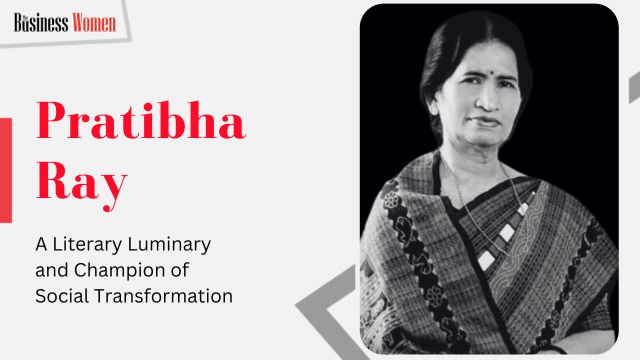Pratibha Ray, the esteemed Indian academic and author renowned for her Odia-language novels and stories, stands as a shining beacon of literary brilliance. Born on January 21, 1944, in the remote village of Alabol, Odisha, her profound impact on Indian literature has earned her national acclaim, including the prestigious Jnanpith Award in 2011 and the Padma Bhushan in 2022.
Early Life and Inspirations
Pratibha Ray embarked on her literary journey with a deep-seated aspiration to shape a society rooted in equality, love, peace, and integration. Initiating her writing at the tender age of nine, she wielded her words as a tool to advocate for a just and harmonious society, free from the constraints of class, caste, religion, or gender bias. Rejecting conventional labels like communist or feminist, she proudly identifies as a humanist, steadfast in her belief in the inherent equality of all human beings and the unique strengths that women bring to society.
Education and Academic Contributions
Driven by her intellectual pursuits, Pratibha Ray ventured into academia. Her career in education spanned roles as a school teacher and professor at various government colleges in Odisha for thirty years. Beyond teaching, she actively guided doctoral research and authored numerous research articles. Her commitment to education extended to her tenure as a Member of the Public Service Commission of Odisha, leaving an indelible mark on the academic landscape of the region.
Advocacy and Social Reforms
Pratibha Ray’s contributions extend beyond the realm of literature to active participation in the fight against social injustices. Notably, she fearlessly protested against caste and religion-based discrimination by high priests of the Jagannath Temple in Puri. Her subsequent article, “The Colour of Religion is Black,” led to a defamation case filed by the temple priests, showcasing her unwavering dedication to justice and social reform.
Philanthropy
Complementing her literary and academic pursuits, Pratibha Ray has been actively involved in humanitarian efforts. In the aftermath of the Odisha Super Cyclone in 1999, she played a pivotal role in relief work, focusing on rehabilitating orphans and widows in cyclone-affected areas. Her philanthropic endeavours underscore her deep concern for the welfare of the vulnerable in her community.
Literary Legacy
Pratibha Ray’s literary repertoire encompasses novels and short stories that resonate deeply with readers. Her debut novel, “Barsha Basanta Baishakha” (1974), marked the beginning of her prolific career. Novels such as “Aranya,” “Yajnaseni,” “Mahamoha,” and “Maharani Putra” delve into the intricacies of the human experience and societal complexities. “Yajnaseni” received critical acclaim, earning the prestigious Moortidevi Award in 1991 and the Sarala Award in 1990.
Her short story collections, including “Ullaghna” and “Sashthasati,” have garnered widespread praise, with several stories adapted into films. Pratibha Ray’s literary contributions extend to travelogues, essays, and scholarly articles.
Recognition and Honors
Pratibha Ray’s literary achievements have garnered her numerous accolades, including the Odisha Sahitya Academi Award, the Sahitya Akademi Award, and the Padma Shri in 2007. The pinnacle of her literary journey arrived with the Jnanpith Award in 2011, a testament to her significant contribution to literature. In 2022, she was bestowed with the Padma Bhushan, India’s third-highest civilian award, in recognition of her outstanding contributions to literature and education.
Conclusion
Pratibha Ray’s life and work exemplify the transformative power of literature as a catalyst for social justice and reform. Her advocacy for equality, humanism, and societal harmony transcends her writing, manifesting in her active engagement with social issues and her steadfast support for the marginalised. Pratibha Ray’s literary brilliance and unwavering commitment to social change establish her as an iconic figure in Indian literature, inspiring aspiring writers and advocates of positive transformation.









